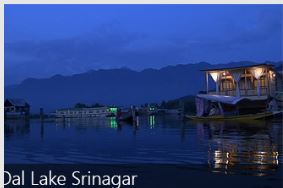Jammu &Kashmir moves from terrorism to tourism

The picturesque border districts of Poonch and Rajouri in the union territory of Jammu and Kashmir have undergone a remarkable transformation in recent years. These regions, once marred by incidents of firing on the Line of Control (LoC), infiltration attempts, and anti-military activities, are now becoming emblematic of a shift from conflict to prosperity, from unrest to tranquility. The winds of change have swept through these areas, ushering in a new era of hope and optimism, where the focus is shifting from “terrorism” to “tourism.”
For decades, the border areas of Poonch and Rajouri were synonymous with tense situations, as cross-border firing and infiltration attempts kept the region in the headlines for all the wrong reasons. The local population bore the brunt of this turmoil, with their daily lives often disrupted by the specter of violence. However, the narrative has taken a positive turn in recent times. The establishment of relative peace along the borders has paved the way for a reimagining of the region’s identity—one that embraces not only its cultural heritage but also its immense potential as a tourist destination.
A key driver of this transformation is the concerted effort by various stakeholders, including the Department of Tourism, the National Rural Livelihood Mission, the Indian Army, and the District Administration. These entities have come together to promote a vision of development that is deeply rooted in the local culture and traditions. The result has been the organization of a series of sports competitions, cultural events, and festivals that have infused the region with renewed energy and vibrancy.
One such event that epitomizes this new direction is the “Frozen Fiesta,” a colorful cultural program held at Dak Bangla in Poonch. This event brought together artists from across the country to showcase their talents and celebrate the region’s rich cultural heritage. The very title of the event, “Frozen Fiesta,” encapsulates the thawing of tensions and the emergence of a festive atmosphere, one where the emphasis has shifted from conflict to camaraderie. The artists who participated in this event were not merely showcasing their artistic prowess; they were also conveying a powerful message of unity and positivity.
The sentiment echoed by the artists—”No to terrorism, Yes to Tourism”—captures the essence of the transformation taking place in these border districts. It is a declaration that the era of militancy and terrorism has given way to a more inclusive and promising future. The artists are ambassadors of change, using their creative expressions to showcase the newfound harmony, religious tolerance, and communal coexistence that have become hallmarks of these regions.
The transition towards tourism is not merely symbolic; it is accompanied by tangible progress in terms of infrastructure and development. The construction and development projects are proceeding at an accelerated pace, turning these areas into attractive destinations for both domestic and international tourists. As roads, accommodations, and other amenities improve, the potential to unlock the natural beauty and cultural heritage of Poonch and Rajouri becomes increasingly evident.
Rajouri, another border district, has also embraced this transformation with open arms. The recent grand cultural program that took place in Rajouri brought together artists from different states, including Rajasthan, Gujarat, Punjab, and Himachal Pradesh. This convergence of diverse artistic expressions mirrors the unity that is being fostered in these regions, transcending geographical and cultural boundaries.
What is particularly heartening is the active participation of local youth in these events. The enthusiasm and engagement of the younger generation signify their willingness to shape the destiny of their communities and contribute to a future that is defined by progress and prosperity rather than conflict.
In conclusion, the narrative of Poonch and Rajouri is a tale of resilience, renewal, and rejuvenation. The transition from a troubled past to a promising present is a testament to the power of collective will and concerted efforts. The emphasis on “tourism over terrorism” is not just a catchy slogan; it is a reflection of a profound shift in mindset and priorities. As these border districts continue to evolve into thriving tourist destinations, they serve as a beacon of hope and inspiration for regions grappling with conflict and unrest. The cultural events, sports competitions, and developmental initiatives are not just events—they are milestones in a journey towards a brighter and more harmonious future.
Also watch our Telegu news portal YouTube :









